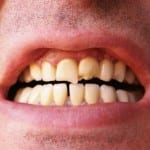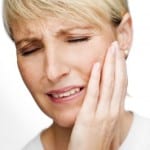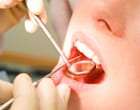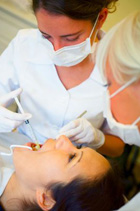 Are you stressed? Do you constantly find that you’re chasing your tail or worrying about how you’ll get things done, how you can help others or find time to tackle a to-do list as long as your arm? If so, you’re not alone. Studies show that many people suffer from stress and this can be damaging to oral health, as well as your general health.
Are you stressed? Do you constantly find that you’re chasing your tail or worrying about how you’ll get things done, how you can help others or find time to tackle a to-do list as long as your arm? If so, you’re not alone. Studies show that many people suffer from stress and this can be damaging to oral health, as well as your general health.
Tooth grinding, also known as bruxism, is often associated with stress and anxiety and if you wake up with symptoms include tooth pain, headaches, migraines, earache or pain in and around your jaw, you may be grinding your teeth during the night. Tooth grinding is a subconscious action and most people are unaware that they do it.
What are the effects of tooth grinding?
Tooth grinding can damage and weaken the teeth, as well as increasing the risk of TMJ (temporomandibular joint) disorder, headaches and ear ache. TMJ disorder is a term given to symptoms that affect the TMJ, the joint, which connects the lower jaw to the skull. Grinding the teeth can also interrupt sleep, which may further increase stress levels and affect your mood, energy levels and concentration.
Stressed? We can help!
If you’re stressed, we can help. With our bespoke bite guards, we can help to prevent damage caused by tooth grinding and ensure you and your partner enjoy a proper night’s sleep. We can also offer information about stress management and provide treatment for TMJ disorder.











 The jury can be out amongst dentists in Leeds when it comes to the affects that chewing gum has on the teeth and gums. Chewing itself, is a process by which to break up food and then to digest. The forces in doing this, impact on the joints of the jaws and place the everyday pressure upon the temporomandibular joint in the mouth (TMJ). There are many other stresses too from talking and clenching of the teeth that add extra pressure in this area. Chewing gum is considered to be a way of relieving tension, but it will also place extra forces upon this area of the mouth that can lead to damage, over time, that may require some hard-core surgery to rectify. Sugar based chewing gum can also promote tooth decay and gum disease too. But, the use of chewing gum can also promote the health of the teeth and gums. If you happen to be on heavy medication, or have been unfortunate to undergo chemo-therapy, this can lower the saliva levels in the mouth, and leave the teeth and gums vulnerable to gum disease and tooth decay. Chewing certain gums however in these circumstances can help to rejuvenate the blood flow in the gums and re-stimulate the saliva in the mouth. Of course, chewing gum is also a classic way of fending of bad breath too because it is a way of removing sticky foodstuffs from the surfaces of the teeth and a way of preventing bacteria and acids from building up in the mouth and damaging the teeth’s enamel.
The jury can be out amongst dentists in Leeds when it comes to the affects that chewing gum has on the teeth and gums. Chewing itself, is a process by which to break up food and then to digest. The forces in doing this, impact on the joints of the jaws and place the everyday pressure upon the temporomandibular joint in the mouth (TMJ). There are many other stresses too from talking and clenching of the teeth that add extra pressure in this area. Chewing gum is considered to be a way of relieving tension, but it will also place extra forces upon this area of the mouth that can lead to damage, over time, that may require some hard-core surgery to rectify. Sugar based chewing gum can also promote tooth decay and gum disease too. But, the use of chewing gum can also promote the health of the teeth and gums. If you happen to be on heavy medication, or have been unfortunate to undergo chemo-therapy, this can lower the saliva levels in the mouth, and leave the teeth and gums vulnerable to gum disease and tooth decay. Chewing certain gums however in these circumstances can help to rejuvenate the blood flow in the gums and re-stimulate the saliva in the mouth. Of course, chewing gum is also a classic way of fending of bad breath too because it is a way of removing sticky foodstuffs from the surfaces of the teeth and a way of preventing bacteria and acids from building up in the mouth and damaging the teeth’s enamel. Just as common as snoring but not nearly as talked about, grinding your teeth in your sleep can have fairly serious repercussions and ought to be taken seriously. As the condition concerns your mouth, your dentist is able to help in diagnosing teeth grinding and then formulating an appropriate response.
Just as common as snoring but not nearly as talked about, grinding your teeth in your sleep can have fairly serious repercussions and ought to be taken seriously. As the condition concerns your mouth, your dentist is able to help in diagnosing teeth grinding and then formulating an appropriate response. We all know how important it is to keep our teeth clean and healthy so that eating, drinking and talking can be undertaken with ease. Brushing and flossing stops plaque building up so that teeth stay free from plaque which can cause them to decay and lead to gum disease. But dental health has implications for the rest of your body too and ought to be seen in those terms. By looking after your teeth you are also looking after your general health.
We all know how important it is to keep our teeth clean and healthy so that eating, drinking and talking can be undertaken with ease. Brushing and flossing stops plaque building up so that teeth stay free from plaque which can cause them to decay and lead to gum disease. But dental health has implications for the rest of your body too and ought to be seen in those terms. By looking after your teeth you are also looking after your general health.

